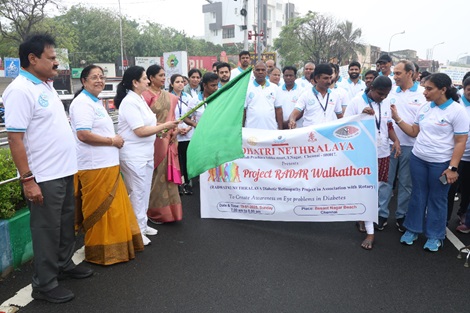World Meningitis Day - Know the signs and symptoms to protect your children
Posted on: 05/Oct/2022 1:05:27 PM

Article by Dr. Ravi Kumar C P, Consultant - Paediatric Neurology, Aster CMI Hospital
World Meningitis Day is celebrated every on October 5th, 2022, to increase awareness about the illness and encourage greater participation. The day is celebrated every year to raise awareness about Meningitis, a condition in which the protective membranes surrounding the brain and spinal cord swell. This is a potentially fatal condition and can lead to permanent brain damage if left untreated. While the condition can affect anyone, it commonly occurs among infants and children. Patients suffering from the condition can develop fever, weakness, headache, drowsiness, lack of energy, stiff neck, fits etc. Meningitis Day thus aims to improve support for those who are dealing with the devastating consequences of the disease and emphasize on the importance of prevention through vaccination.
What are the causes of Meningitis?
Meningitis approximately affects more than 200,000 lives annually every year and is a potentially deadly disease. The causes of meningitis are broadly classified as infectious and non-infectious. Bacterial and Viral infections are the most common causes of infectious meningitis whereas health issues like cancer or a head injury are the causes of non-infectious meningitis.
Bacterial meningitis is the most deadly form of meningitis and is a medical emergency as it can lead to permanent disability or death. This usually spreads between people in close contact.
Viral meningitis on the other hand is less fatal and accounts for almost 85% of the cases. Other viruses that can cause the condition include herpes simplex virus, influenza virus, mumps virus and human immunodeficiency virus (HIV).
There are also several other types of meningitis which include -
Fungal meningitis: Viral meningitis on the other hand is less fatal and accounts for almost 85% of the cases. Other viruses that can cause the condition include herpes simplex virus, influenza virus, mumps virus and human immunodeficiency virus (HIV).
Parasitic meningitis: It is mostly caused by parasites that are present in dirt, feces, grains, or poultry. The infection is caused only when the parasite eggs are ingested and cannot be caused by mere touching or coughing of a person infected with the condition.
Noninfectious meningitis: It is a side-effect or complication of an underlying health problem. Conditions such as systemic lupus erythematosus, drug-induced, head trauma, brain surgery, and cancer-related problems can cause the inflammation of the brain tissue.
What are thehe signs and symptoms of Meningitis?
The signs and symptoms of meningitis are mostly triggered due to the swelling and may develop over several hours or days. These include -
- Sudden and severe high fever or fever lasting for more than a week
- Severe headaches
- Stiffness in neck
- Vomiting and Nausea
- Reduced consciousness
- Seizures
- Skin Rash
- Lethargy
In newborns the signs and symptoms may include high fever, irritability, excessive sleepiness, stiffness in the neck and body of the baby, a bulge on the baby`s head and poor feeding. Long term sequelae include hearing loss, learning issue, seizures and also disability. In case you witness these signs in your newborn then it is advisable to seek medical attention as early treatment can help in preventing any serious complications.
How is it treated and prevented?
There are different treatment methods that are used for different types of meningitis. For example - bacterial meningitis is treated with antibiotics to prevent brain damage or death. Whereas, Fungal meningitis requires the use of antifungal medications, while viral meningitis may need specific medication called Anti-Viral drugs for specific viruses only. However, the key to prevention is knowing the right cause and seeking timely treatment as untreated meningitis can turn fatal.
Your family doctor or pediatrician can diagnose meningitis based on your medical history and will conduct a physical examination along with several diagnostic tests. During the assessment, your doctor will check for signs of infection.







